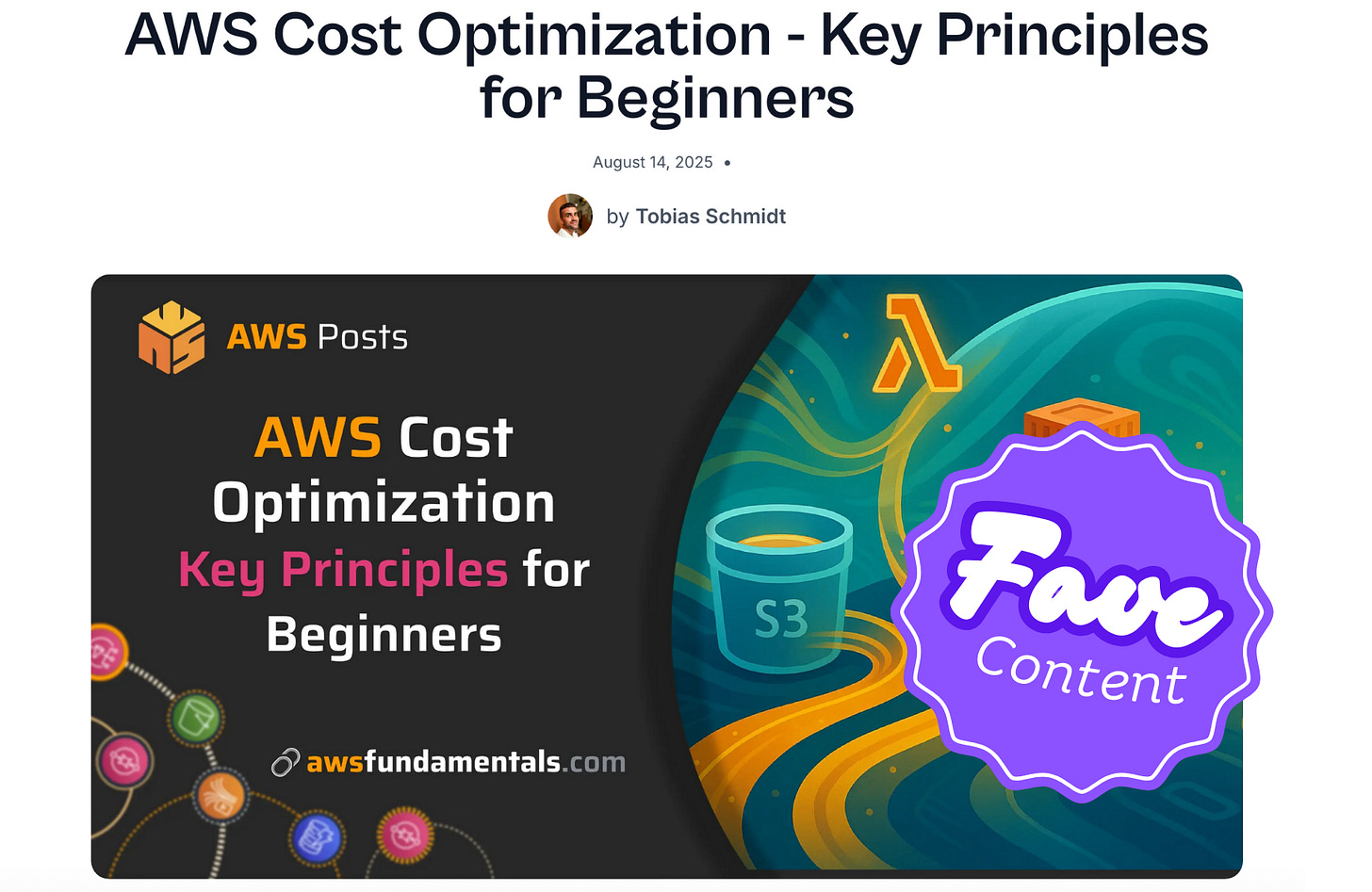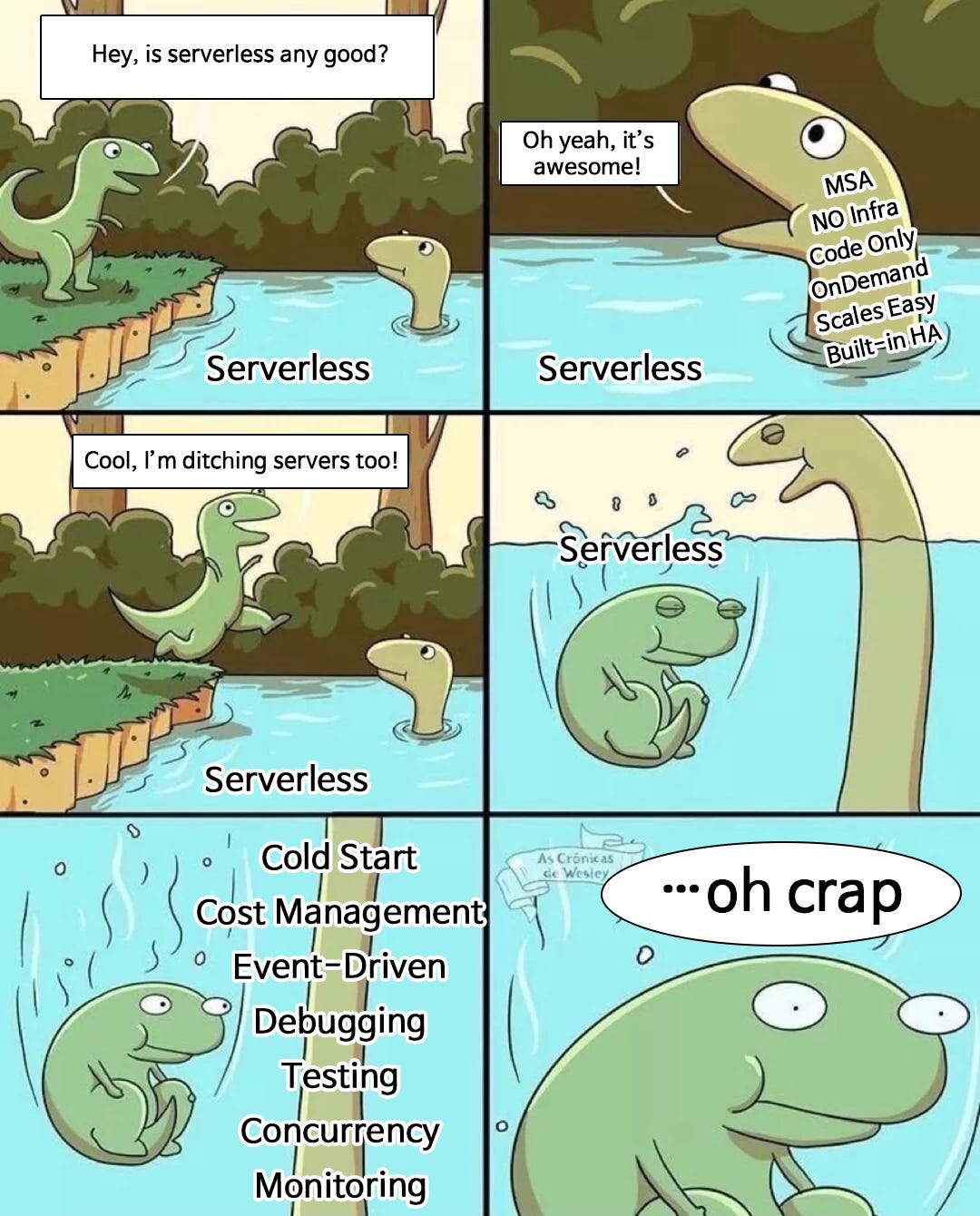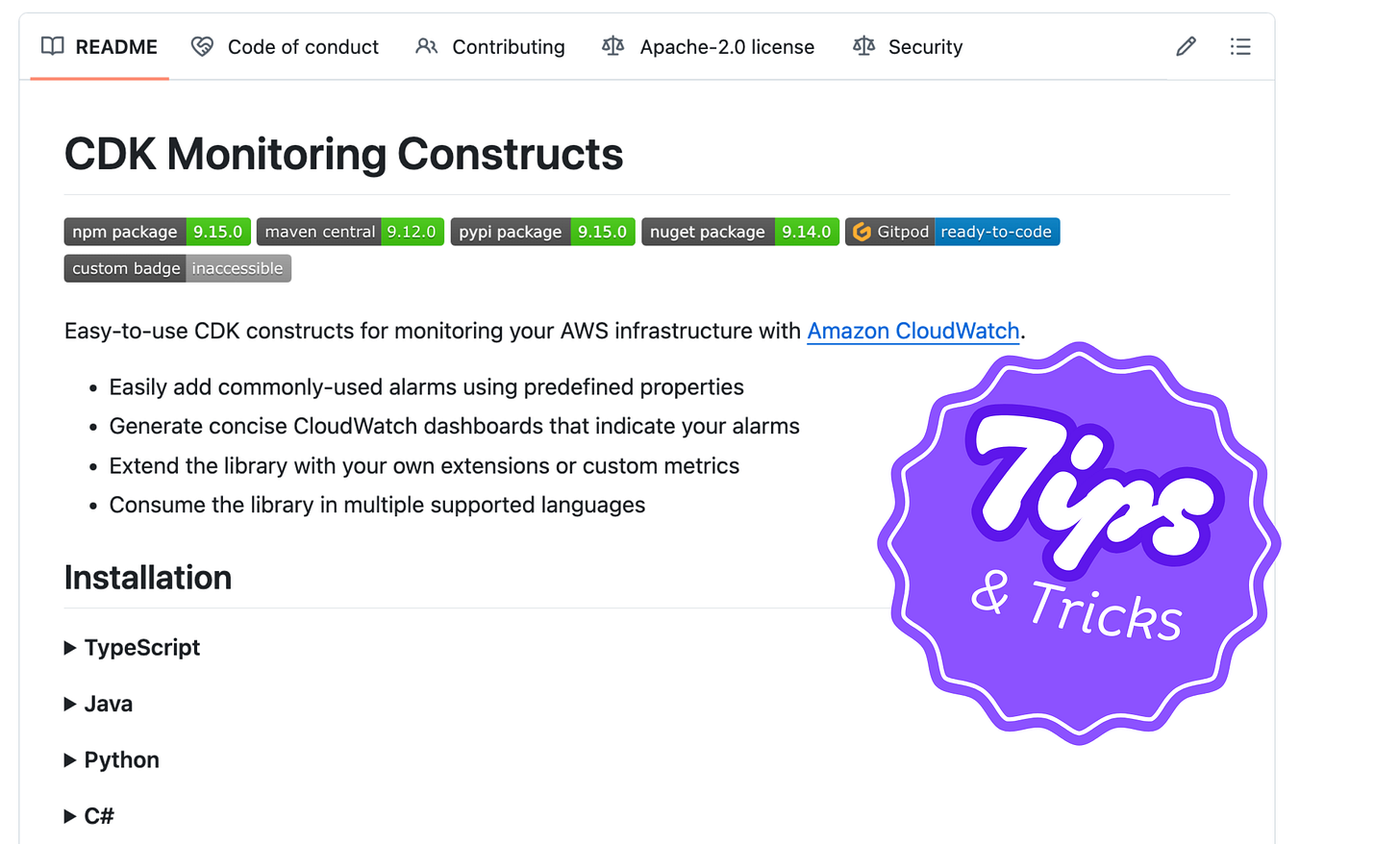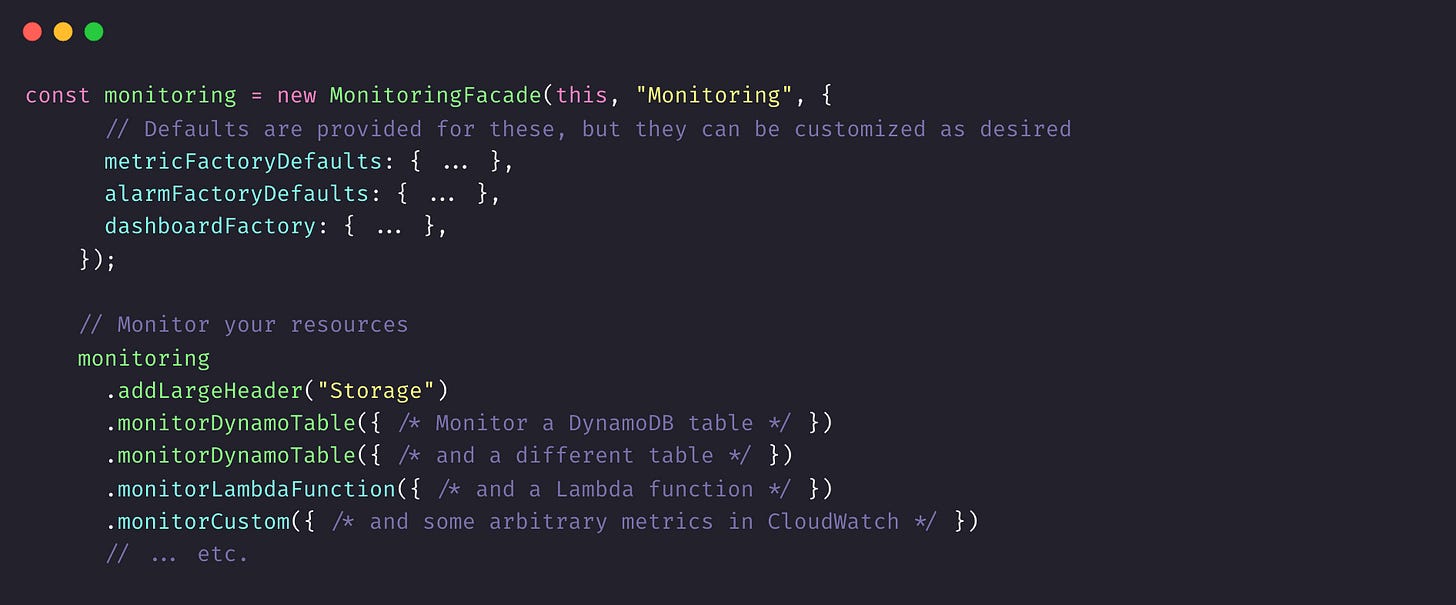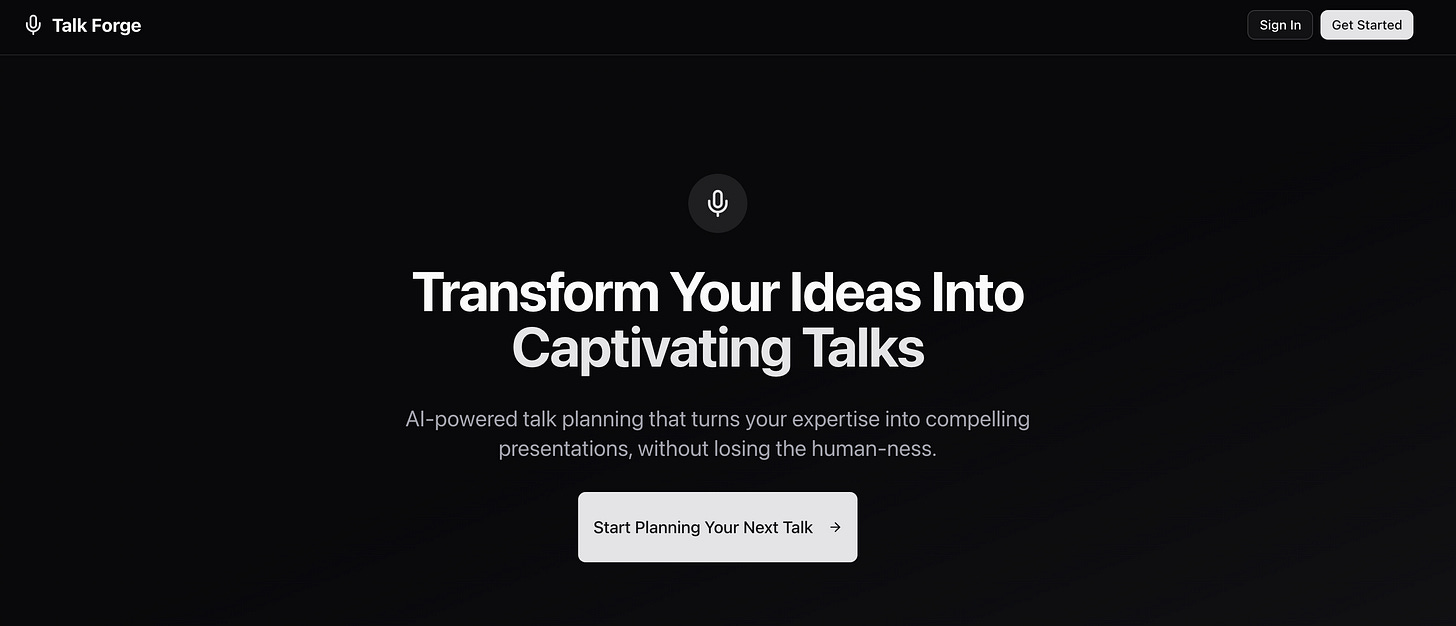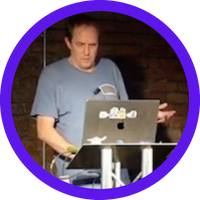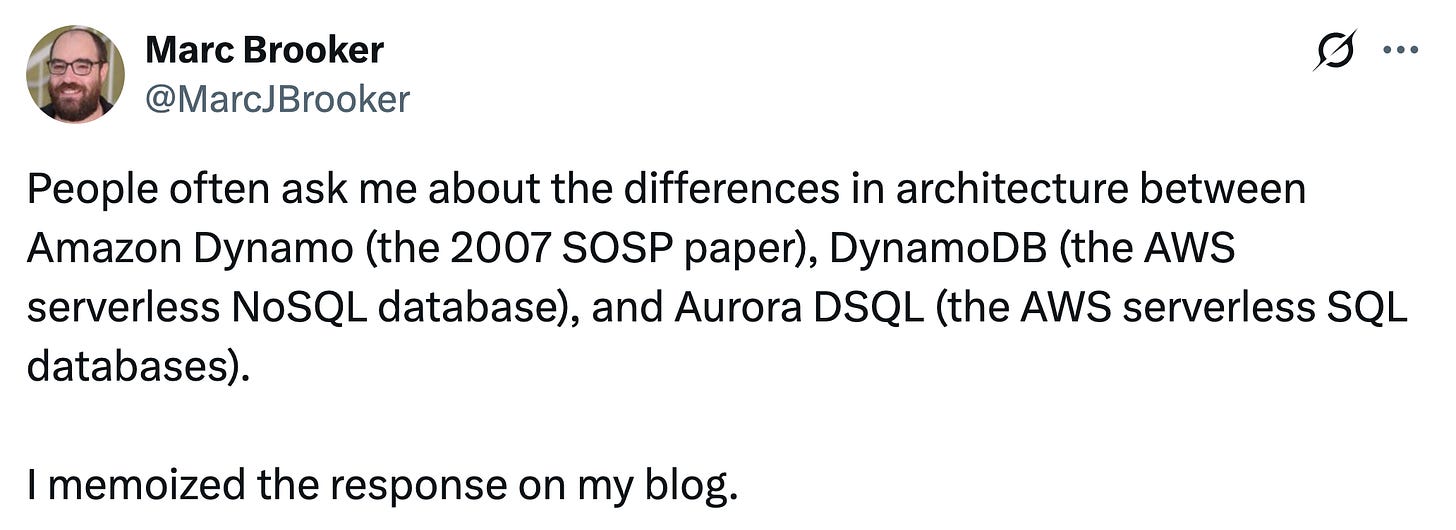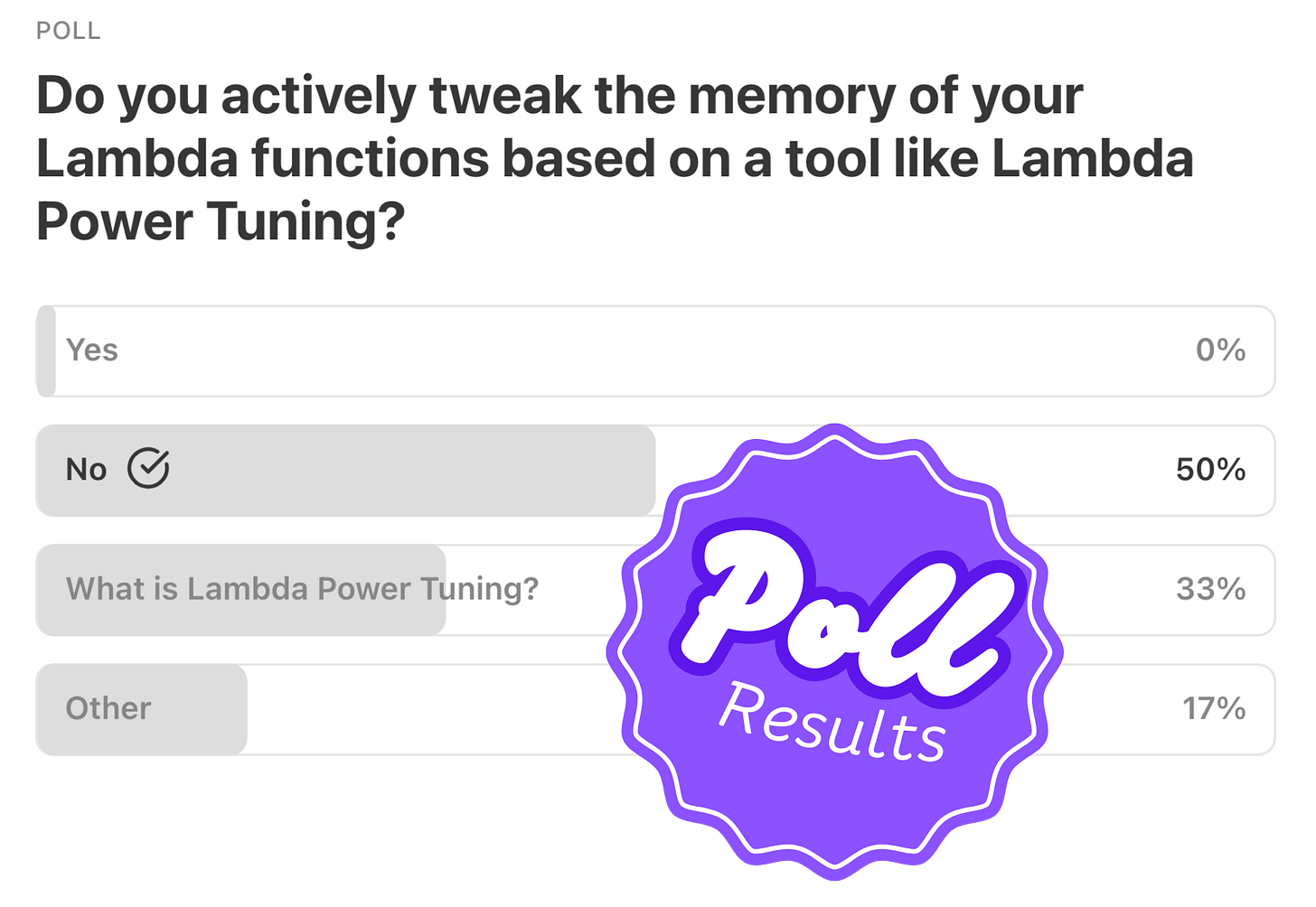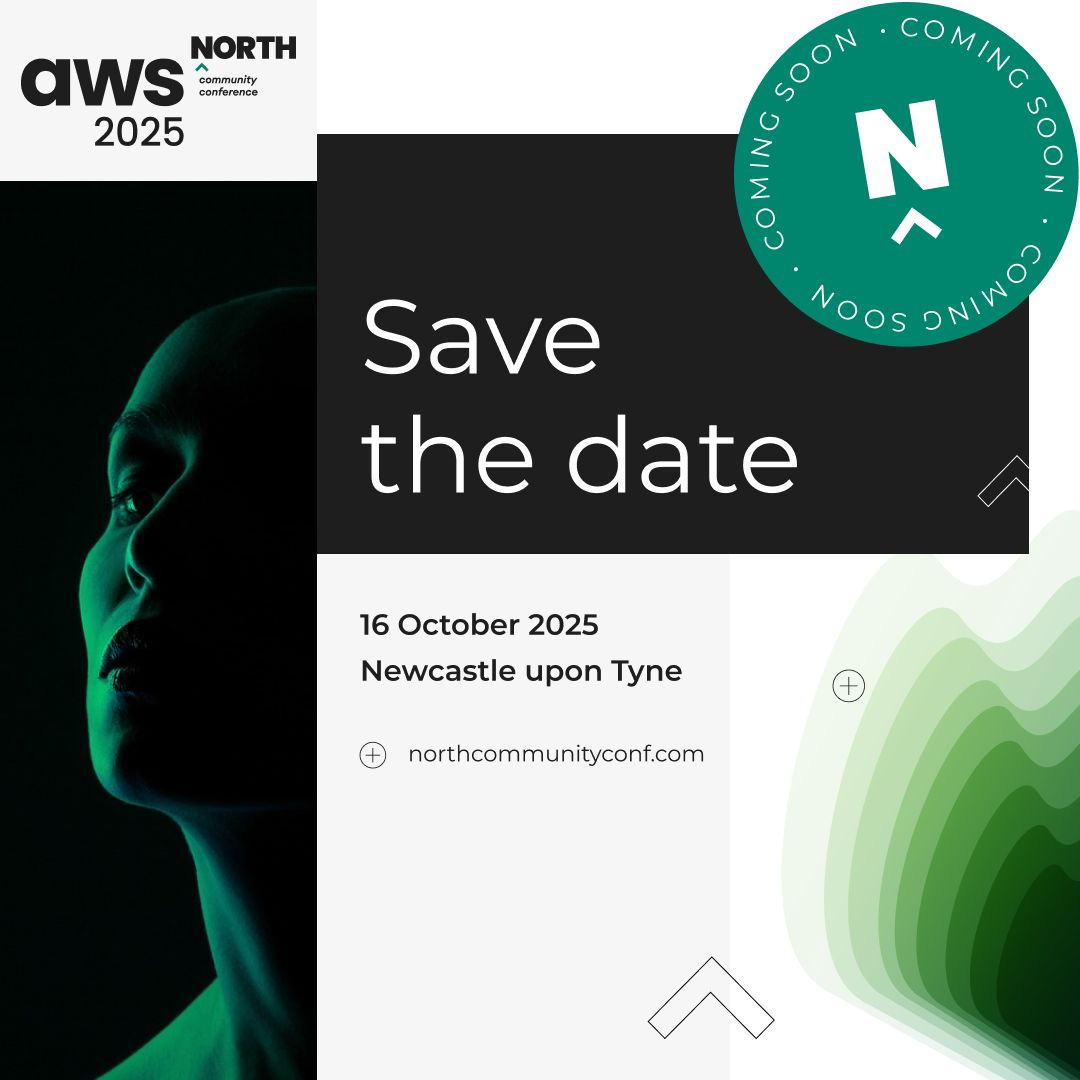#49 New AWS Heroes 🦸🏽
This week, we have two serverless experts of the week, our spotlight falls on AWS Community Builders Manager Jason Dunn, and we look at the latest service releases, news, articles, & more!
Welcome
In last week’s issue, our serverless expert was AWS Community Builder Robert Bulmer, and our spotlight fell on Serverless Author Mark McCann!
This week, to celebrate the new AWS Heroes, we have two serverless experts of the week! AWS Community Builder Chris Dobson and AWS Serverless Hero Sang (Chris) Park, our spotlight falls on AWS Community Builders Program Manager Jason Dunn, and we look at the latest AWS service releases, blog posts, hints and tips, news and more!
This week’s newsletter is sponsored by Leighton.
New AWS Heroes! 🦸🏽
This week, we got a new group of AWS Heroes!
AWS Community Hero Kristine Armiyants
AWS DevTools Hero Raphael Manke
AWS Machine Learning Hero Nadia Reyhani
AWS Security Hero Rowan Udell
AWS Serverless Hero Sang (Chris) Park
AWS Community Hero Toshal Khawale
Welcome to the team, and looking forward to collaborating!
📰 Articles that caught the eye
Here are some stand-out articles I read during the week in the World of Serverless, AI, Engineering and Architecture!
⭐ My favourite this week was around cost optimisation by Tobias Schmidt.
‘Effectively building AI agents on AWS Serverless’ by Anton Aleksandrov and Dhiraj Mahapatro.
Jason Conway-Williams covers ‘AWS CDK & DynamoDB GSIs — Beating the One-Index-Per-Update Bottleneck’.
Pravesh Sudha discusses ‘Deploying a Highly Scalable & Available Django Application on AWS with Terraform‘.
Vadym Kazulkin has a great article titled ‘Amazon Bedrock AgentCore Gateway - Part 2 Exposing existing Amazon API Gateway REST API via MCP and Gateway endpoint‘.
Eyal Estrin discusses ‘Bridging the Gap Between Security and Innovation‘.
Tobias Schmidt has a useful blog titled ‘AWS Cost Optimization - Key Principles for Beginners‘.
Uriel Bitton covers ‘Data Modeling DynamoDB Data With Filtering, Sorting & Pagination‘ (although this is a member-only story)
🎓 Ask the Expert
Each week, I ask a different serverless expert the same three questions to get their personal insights - our first this week is AWS Serverless Hero Sang (Chris) Park:
Opinions are the author’s and do not express the views of their employer.
1. What is one common mistake you see teams making when implementing serverless solutions, and how can they avoid it?
I love serverless, and my motto is to solve as many problems as I can with it—while also doing my best to spread the word through YouTube and by running user groups. That said, I’m very careful not to claim it solves every problem easily.
From my experience, one of the most common misunderstandings is treating serverless as a silver bullet. Since it’s easy to get started with and simple to spin up quick solutions, it’s natural to assume serverless can handle everything smoothly. But in practice, building reliable systems requires a solid understanding of architecture and how the cloud works. Without that preparation, teams may encounter challenges such as unexpected costs or Lambda throttling that can impact system stability.
To me, applying serverless architecture beyond a certain scale is like a lightsaber: powerful, but potentially dangerous unless the Force is with you. Just as Jedi train hard to master the lightsaber, developers also need preparation to wield serverless properly. (Maybe not that hard—you don’t need to be able to predict the future—but you get the point!) That preparation means researching best practices for each problem, setting up observability, investing in testing, running cost simulations, and putting guardrails in place to truly unlock the full power of serverless.
2. Which serverless tool or service are you most excited about right now, and why?
Recently, I’ve been diving into Aurora DSQL—and it’s awesome! I’ve already built more than five applications using DSQL as the main database, and my team at work has even decided to use it for our next product.
What excites me the most is that it allows me to try out all kinds of logic that were previously off-limits with DynamoDB because of its lack of transaction and join support. (For the record, I don’t consider Aurora Serverless to be truly serverless—it’s arguable, but that’s my view 😊)
Of course, Aurora DSQL still has its flaws and plenty of room for improvement. But even with that, I believe it has the potential to shift the paradigm of serverless architectures in a big way.
3. What is your favourite trick or tip when working with serverless that the readers may find interesting?
Well, this is more of a hack than a proper trick or tip—but since the question asks for something “interesting,” I’ll share it. Keep in mind: this might not be the best practice, and in some situations, it could be very inefficient 😊.
Here’s the scenario I faced:
You have an SQS queue storing tasks for a processing API—such as parameters for the API, or references like the original file’s bucket and key to process.
The processing API takes more than 15 minutes to complete.
It only supports asynchronous callbacks.
The API has a concurrency limit of 10—if you exceed it, you’ll get 429 throttling errors.
The goal: handle this using a fully serverless architecture.
My approach
A Lambda function polls messages from SQS.
That Lambda calls the processing API, passing along a callback URL for later notification.
The callback endpoint is then responsible for deleting the SQS message once the processing finishes.
To manage concurrency, I assign a FIFO Message Group ID with 10 different hash values—ensuring that at most 10 messages are in-flight at once. When one finishes and is deleted via the callback, another becomes visible, keeping concurrency stable.
The point is to use Lambda only for polling messages from the SQS queue, while delegating the actual message deletion to another component—in this case, the callback function.
Unfortunately, this doesn’t work as intended. Lambda’s Event Source Mapping (ESM) will automatically delete the SQS message once the function succeeds, regardless of what you do in your code. That means you can’t delegate deletion to another component, like the callback function. As a result, messages are deleted prematurely, breaking the FIFO concurrency logic.
One obvious alternative is to use Step Functions, which handle this kind of workflow nicely—but they also introduce higher costs. Instead, my workaround is to attach a Lambda execution role that explicitly denies sqs:DeleteMessage. Since the ESM inherits this role, it fails to delete messages after execution. This way, the messages stay in the queue until the callback function deletes them, preserving the intended concurrency control.
There’s a downside, though. If AWS detects too many failed delete attempts from ESM, it may automatically disable the mapping. To work around this, I run an EventBridge cron job that periodically re-enables the mapping. It’s not elegant, but it works.
Once again, this is purely for interest. However, it’s also logic that I’m actually using in one of my side projects running live—and it works surprisingly well 😊.
TL;DR: By denying sqs:DeleteMessage in the Lambda execution role, you can prevent Event Source Mapping from deleting messages automatically, allowing other components (like a callback function) to handle message deletion instead.
✅ Bonus tip: join the hashtag#believeinsls discord! There is a community there to answer any questions you may have without getting overzealous on serverless or without judgment! Check it out!
🧠 Tips & Tricks
This week’s tip is around monitoring and alerting in your AWS CDK solutions!
I am finding myself using the cdk-monitoring-constructs package more and more in my solutions, as this gives you a very easy-to-set-up set of alarms, dashboards, and widgets for the most commonly needed services and use cases; across TypeScript, Java, Python and C#!
They cover a plethora of services, including (but not limited too) DynamoDB, API Gateway, AppSync, Aurora, CloudFront, ECS, S3 and more!
🚀 New Releases
Here are the latest and most interesting releases this week in the AWS World:
⭐ This week, my favourite service release was the live log tailing in Amazon ECS.
OpenSearch UI supports Fine Grained Access Control by SAML attributes.
AWS Lambda now supports GitHub Actions to simplify function deployment.
Amazon OpenSearch Serverless introduces automatic semantic enrichment.
Amazon Aurora Serverless v2 now offers up to 30% performance improvement.
AWS Billing and Cost Management Console adds new recommended actions.
Amazon DynamoDB now supports more granular throttle error exceptions.
Amazon DynamoDB now supports a CloudWatch Contributor Insights mode. exclusively for throttled keys.
Amazon Athena now supports CREATE TABLE AS SELECT with Amazon S3 Tables.
AWS Cloud Map adds support for cross-account service discovery.
AWS Batch now supports AWS Graviton-based Spot compute with AWS Fargate.
Amazon DocumentDB announces Extended Support for Version 3.6.
Amazon ECS console now supports real-time log analytics via Amazon CloudWatch Logs Live Tail.
🔥 Tip: Check out https://aws-news.com/ for the very latest up-to-date serverless releases as they happen, created by the talented AWS Serverless Hero Luc van Donkersgoed.
👷🏻 Tools & Frameworks
Check out the latest open-source frameworks, news, and tool updates from the past week.
TalkForge - AI-powered talk planning that turns your expertise into compelling presentations, without losing the human-ness. This is a great app that is in it’s preview release, by a friend of the newsletter, James Eastham. I have used this personally and think it is a great idea.
EventCatalog - now supports webrtc channels.
chess-support-mcp - this is very much included for fun, but is very cool - an MCP server that manages the state of a chess game for LLMs/agents.
AWS Lambda Execution Visualizer - my colleague Mark Sailes created a neat tool to help people understand how Lambda manages execution environments based on request patterns.
CloudCards - I have added additional cards to the small, fun app I created for micro-learning around fundamental engineering and architecture concepts.
🎓 Ask the Expert
Our second Serverless expert of the week, this week, is AWS Community Builder Chris Dobson:
Opinions are the author’s and do not express the views of their employer.
1. What is one common mistake you see teams making when implementing serverless solutions, and how can they avoid it?
I would say this is not necessarily a mistake, but automatically using Lambda when the same can be achieved by using a service/component that doesn't require any code.
One example I saw recently was triggering a Lambda from an SQS queue that simply took the record and invoked a Step Function with the unchanged record as the input; this could have been an Eventbridge Pipe.
Other examples include things like using a Lambda in API Gateway for simple CRUD or from an EventBridge bus target with no transformation, when both API Gateway and EventBridge can integrate directly with the majority of AWS services.
So to put it simply, when you're reaching for Lambda, take a look and see if there are any direct integrations you can use instead.
2. Which serverless tool or service are you most excited about right now, and why?
I'm really enjoying using Bedrock at the moment. I think having a managed GenAI service with access to so many models, playgrounds, guardrails, agents, RAG, and many other features opens up the opportunity to experiment with and create applications using GenAI to many more people, which can only be a good thing.
Very much looking forward to seeing what comes next...
3. What is your favourite trick or tip when working with serverless that the readers may find interesting?
If you're working with Step Functions, I find the Workflow Studio in the AWS toolkit really useful - I can visually edit any existing state machines in the same way as in the AWS console, create new ones, re-deploy, execute, pretty much do everything I need to do from within my editor. Saving the definition locally is great for being able to create the state machine visually and add to IAC in a single step - previously, I found this involved a lot of copy/paste from the console.
Also, take advantage of the fact that there's usually little or no cost for many serverless services (until you need to scale anyway) and experiment, experiment, experiment!
✖️ Social of the Week
This week’s social is by AWS VP/Distinguished Engineer, Marc Brooker:
You can access the link to Marc’s blog post here, and it is a super interesting read, for sure.
What are your thoughts on this? Feel free to leave a comment below.
🎙️ YouTube & Podcasts
Here are some of my favourite videos and podcasts this week covering serverless, AI, architecture, and software engineering.
⭐ My favourite video this week was by Dave Farley asking if Vibe Coding is the worst idea of 2025.
Mark Sailes and Java In The Cloud cover ‘Big business impact with a simple AI solution‘.
Dave Farley asks the question, “Vibe Coding Is The WORST IDEA Of 2025“?
The Logicata podcast season 4 Episode 32 covers ‘Bigger Payloads, Bedrock Expansion, and Capacity Constraints’ with guest Uriel Bitton.
Vlad Khononov & Sheen Brisals discuss ‘Balancing Coupling in Software Design‘ on the GOTO podcast.
Serverless Craic Episode 70 covers ‘Frictionless Developer Experience in the Age of AI’.
Derek Comartin covers ‘Stop Writing if (!x) — Here’s Why It’s Bad Software Design‘.
Steph Gooch asks “Why Your S3 Storage Costs Are High (& How To Fix It)“ on the AWS Developers channel.
Weekly Case Study 🔍
This week’s case study comes from Netflix, and how they handle sudden load spikes in the cloud
This one is from re:Invent 2024, but there are so many interesting facets to this talk, and so much to learn from it.
🗣️ Inspirational Quotes and Thoughts
This week’s inspirational quote is by Dan Koe, author of The Art of Focus:
“You can log 8 hours of World of Warcraft or staring at your phone without blinking an eye but can't focus for 30 minutes on work that will change your life.
You don't have a focus problem.
You just don't see your life as a game and don't treat your goals as quests.“
I love this quote from Dan, as for the past ten years I have personally had a key focus like this, where I have a strong focus on goals and consistency. Nobody is saying you shouldn’t have time for computer games or simply relaxing, but if that is your norm you will not grow like a person focused on short, medium and long-term goals.
What are your own thoughts and experiences of this quote? Feel free to leave a comment below.
🗳️ Poll of the Week
In last week’s poll, we asked the question “Do you actively tweak the memory of your Lambda functions based on a tool like Lambda Power Tuning?”.
Interestingly, 50% of people said no, 33% had never heard of Lambda Power Tuning, with 17% saying other. Super interesting that nobody said yes. For the 33% here is a link to Lambda Power Tuning.
This week, we ask the question, “What is your go to service for containers on AWS?”.
Feel free to leave a comment below on why you chose your answer and your experiences!
📅 Serverless Events
The following serverless events are upcoming, so mark your calendars.
🎟️ To note, tickets are available for the AWS North Community Conference, which I am helping organise so go check it out!
Other fantastic events happening soon:
ACD Adria - 5th Sept 2025
AWS Community Day Baltic - 10th Sept 2025
ACD Bay Area - 17th Sept 2025.
ACD Aotearoa - 18th Sept 2025
ACD Poland - 18th Sept 2025
ACD Portugal - 27th Sept 2025
ACD DACH - 7th Oct 2025
ACD Nordics - 10th Oct 2025
AWS North Community Conference - 16th Oct 2025
ServerlessDays Milano - 21st Oct 2025
ServerlessDays Cardiff - 23rd Oct 2025
Serverless Architecture Conference - 20th-22nd Oct 2025
ServerlessDays Sao Paulo - 5th Nov 2025
Do you have any upcoming events that you want to highlight? Message me below!
⭐ Spotlight
This week’s spotlight falls on AWS Community Builders Program Manager Jason Dunn:
Jason runs the fantastic global AWS Community Builders programme, which offers technical resources, education, and networking opportunities to AWS technical enthusiasts and emerging thought leaders who are passionate about sharing knowledge and connecting with the technical community; as well as providing informative sessions and learning opportunities with AWS service teams and experts, covering everything from new service ideas to best practices and patterns!
Having been part of the programme for four years before becoming an AWS Hero, I know the sheer amount of hard work and effort it takes to make this programme a global success!
Thank you for everything you do for our amazing community Jason!
Thank you for reading the latest Serverless Advocate Newsletter!
If you want to find out a little more about me, please have a look at:
https://www.serverlessadvocate.com/
See you next time,
Lee





